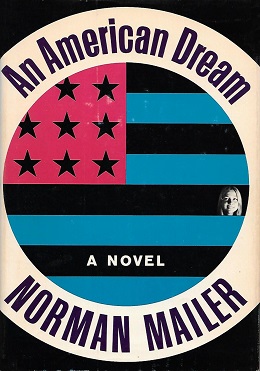An American Dream (novel)

First edition cover
|
|
| Author | Norman Mailer |
|---|---|
| Cover artist | Paul Bacon |
| Country | United States |
| Language | English |
| Publisher | Dial Press |
|
Publication date
|
1965 |
| Media type | Print (Hardcover) |
| Pages | 270 |
An American Dream (1965) is Norman Mailer's fourth novel, published by Dial Press. Mailer wrote it in serialized form for Esquire, consciously attempting to resurrect the methodology used by Charles Dickens and other earlier novelists, with Mailer writing each chapter against monthly deadlines. The book is written in a poetic style heavy with metaphor that creates unique and hypnotizing narrative and dialogue.
The book's protagonist, Stephen Rojack, is a decorated war-hero and former congressman, a sensationalist talk-show host, and is an embodiment of the American Dream. In an alcoholic rage, Rojack murders his estranged wife, a high society woman, and descends into a lurid underworld of Manhattan jazz clubs, bars, and Mafia intrigue after meeting Cherry McMahan, a night-club singer and the girlfriend of a highly placed mobster. Rojack feels liberated by the violence and imagines himself receiving messages from the moon, perceiving voices that command him to deny his guilt. He makes the death appear as a suicide, and maintains his innocence no matter how intense the scrutiny or severe the consequences. In the course of the next twenty four hours, Rojack sets his will against the New York City Police Department, the intimidation of an erratic black entertainer who draws a knife on him, and the gathered political clout of his dead wife's father, Barney Oswald Kelly, who suggests that higher political affairs have an interest in Rojack's fate.
The book was controversial for its portrayal and treatment of women, and was singled out for especially harsh critique by feminist critic Kate Millett in her groundbreaking study of the treatment of women in literature, Sexual Politics. Mailer responded to the criticisms of Millett and other feminists in his own polemic The Prisoner of Sex, where he avoids defending himself directly, instead speaking his own case through an extended defense of two other writers who were also singled out by Millett, Henry Miller and D. H. Lawrence. The novel was edited for book publication by E. L. Doctorow. The reviews for An American Dream were mixed, and for years the conventional wisdom was that the novel was one of Mailer's lesser works of fiction. The book has its strong defenders, notably in the writings of critics Richard Poirier in his 1972 study Norman Mailer, and Barry H. Leeds in his two books The Structured Vision of Norman Mailer (1969) and The Enduring Vision of Norman Mailer (2002).
...
Wikipedia
